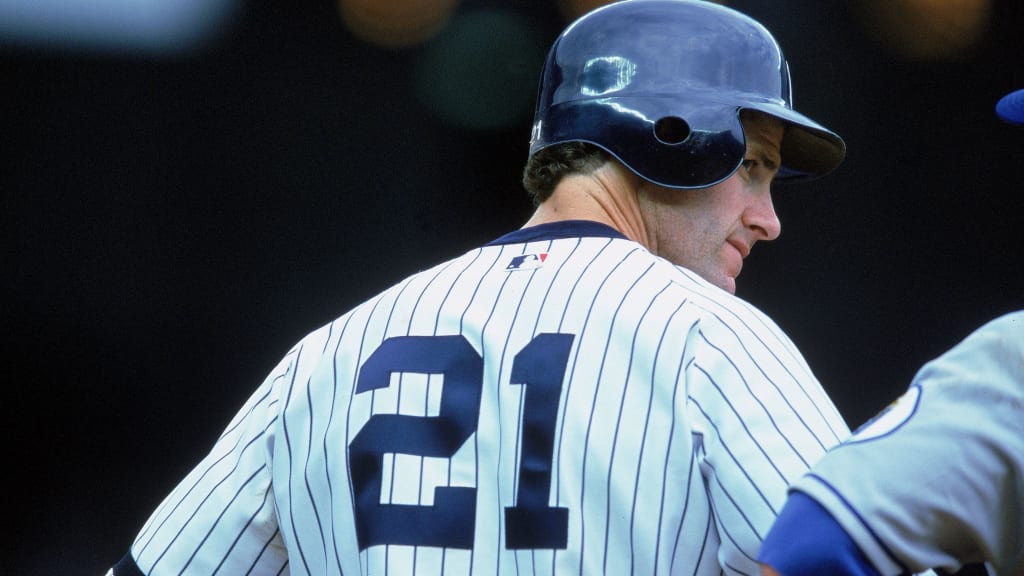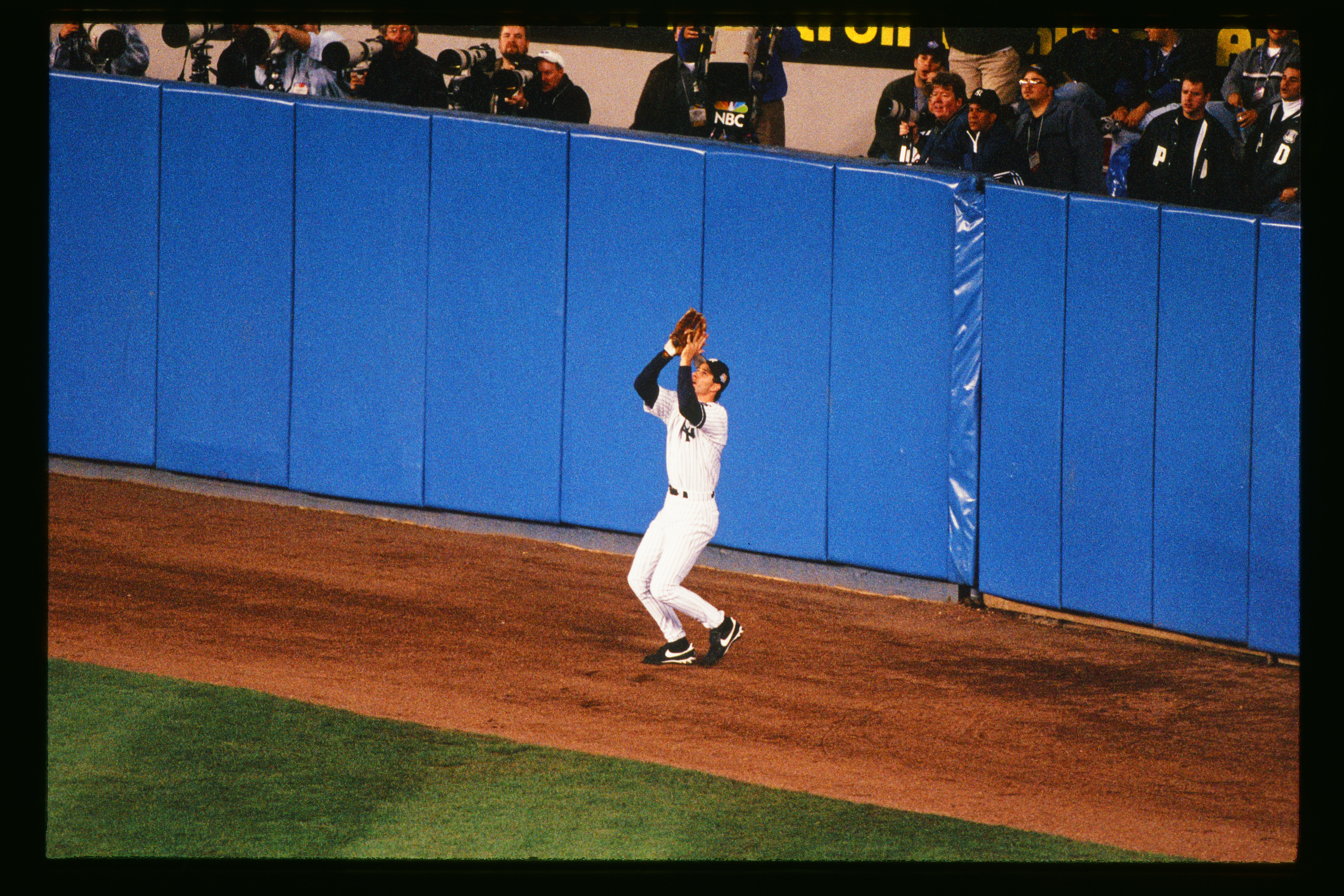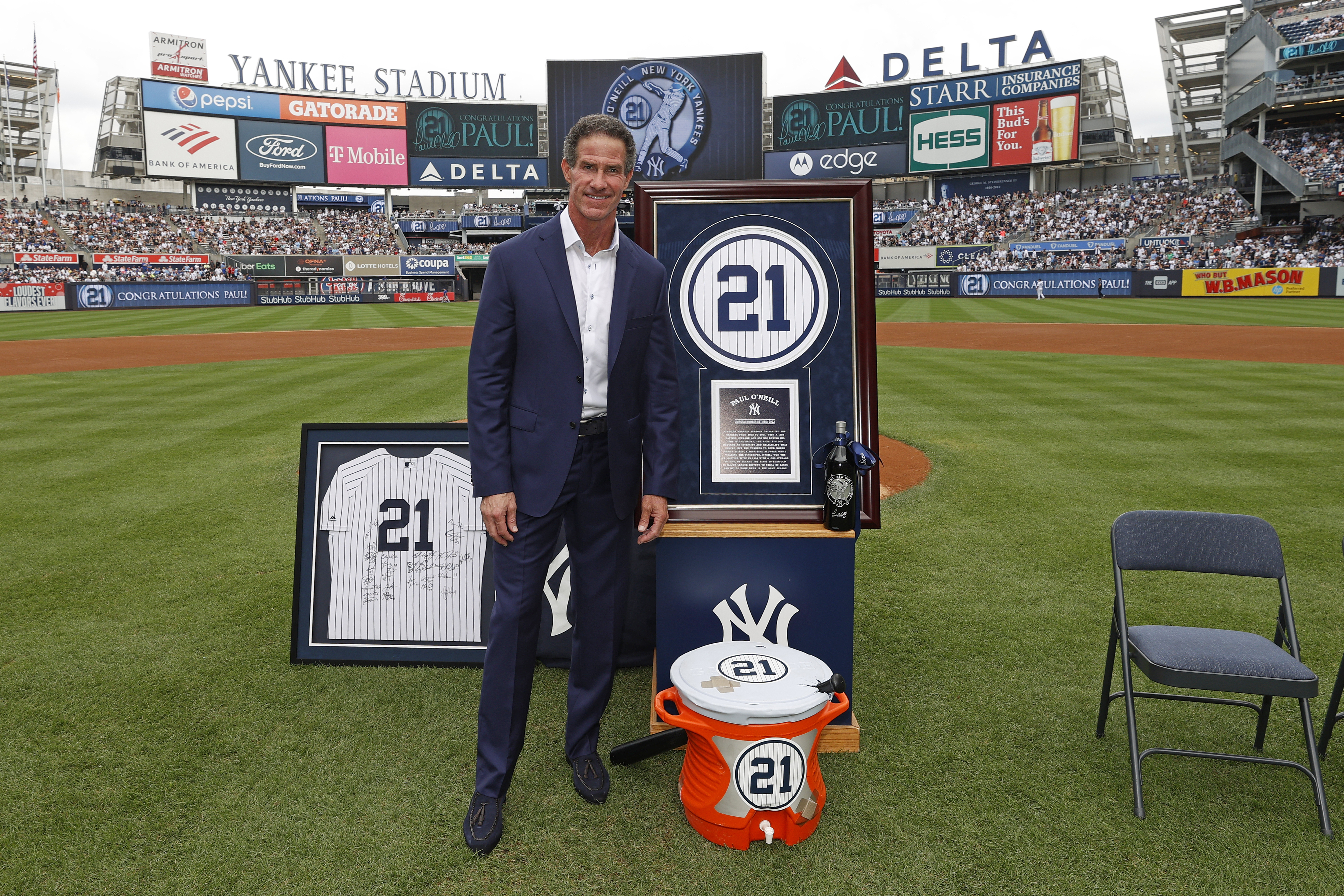
Paul O'Neill was already a winner when he was traded to New York in the fall of 1992, having celebrated a world title with the 1990 Cincinnati Reds. But that was just a preview of what was to come for George Steinbrenner¡¯s beloved Warrior. One of the emotional rocks of the late-¡¯90s Yankees dynasty, the right fielder demanded impossible levels of excellence from himself, and more often than not delivered what was required.
The rings from all the October successes are shiny, and the parades all were joyous occasions, but each journey is its own story. And as far as championship seasons go, the 1999 campaign was a difficult one for O¡¯Neill, who endured his manager¡¯s health scare in Spring Training, then his father¡¯s passing during the World Series.
As the 1999 Yankees celebrate a quarter century since their triumph, O¡¯Neill spent time over one of his Warrior 21 India pale ales reminiscing with Yankees Magazine deputy editor Jon Schwartz, thinking back to the ways that Derek Jeter emerged in Aaron Judge-like fashion, how the lessons and memories change as you get older and the impact that being traded to the Yankees had on every part of his life.
Yankees Magazine: I¡¯ve had the chance this year to speak to a lot of your teammates from those teams in the late 1990s. I¡¯ll ask you the same question I asked all of them: How different is one year from the next? I mean, this is the 25th anniversary of 1999, but last year was the 25th anniversary of 1998. Next year will be 25 years since the Subway Series in 2000. Do those manifest as separate memories for you?
Paul O¡¯Neill: The pressure going into the World Series of 1998 was huge, because if you don¡¯t win the World Series after as many games as we had won, you¡¯re not remembered as a champion. In 1998, everything went perfect. In ¡¯99, obviously, sweeping the Braves. And then 2000 was probably as much fun as I¡¯ve ever had on a baseball field. You couldn¡¯t get away from it. A Mets-Yankees World Series! You¡¯d get on a bus, you¡¯d drive across the bridge, you picked up the paper, you watched the news. You could not get away from what was going on. You thought the whole world was involved in it. But the pressure we had, it was pretty much, we had to win; Mr. Steinbrenner made that apparent. We had to win. So, it was kind of a no-win situation. We were supposed to win. We had won before, but you never know in a short series what can happen.
YM: As you go through life now -- as a former player, a father, a grandfather, a baseball analyst, a surprisingly proficient drummer -- do the lessons of your life and the things that you got from baseball change? Are you leaning on the same lessons?
PO: It¡¯s amazing to me how many parallels there are in life and sports. It¡¯s the discipline. No season¡¯s ever perfect. There¡¯s always ups and downs. Life is the same way. Whether you¡¯re a great baseball player in high school, all of a sudden you¡¯re a horrible player because there are great players at the professional level. But these are lessons that your kids see from afar, and you hope that they learn them. And I feel that they have. Sports is something that I did my whole life; I never dreamed about doing anything else. I got to live out a dream. But it¡¯s never easy, and it¡¯s never perfect. For Aaron Judge, it looks easy; it¡¯s not easy. The time that he has put in, the ups and downs of the not knowing in the Minor Leagues if you¡¯re ever going to get that chance. That¡¯s everybody¡¯s trip. There¡¯s so many disappointments, so many question marks. Am I good enough for this? And then, you¡¯re one injury away from your career being over. A lot of things have to go well for a career to be what you want.
YM: That 1999 postseason, on top of everything else, you¡¯re playing with a busted rib. What¡¯s pushing you through there? Is it just the light at the end of the tunnel?
PO: You¡¯re so close to the finish line, you have to somehow finish it. Whether you have a broken leg, a broken rib, a bad hamstring -- at that time of the year, you have so much emotion, so much adrenaline, that you get through things. It¡¯s just the way it is. Everybody else out on the field is dealing with something. But once the lights are turned on and the crowd noise is there, you want to be out there, to be part of something great. You want to win another World Series.
YM: When you¡¯re in the booth, calling games on YES Network, you¡¯re watching a game you played, a sport that you excelled in. You don¡¯t necessarily know what it¡¯s like to face Corbin Burnes, but you have an idea. Some people might not want to hear the ¡°Back in my day ¡¡± stuff, but how do you balance sharing the insights from, literally, back in your day, with observing the game as it exists today?
PO: First of all, when I went up into the booth after retirement, it was much harder, because you¡¯re looking down at the field at things that you can still basically do. Now, I¡¯m so far away from the game, I¡¯m almost watching it from the perspective of a fan, and just in amazement of this guy throwing 102 [mph] and Aaron Judge hitting one 500 feet. But you appreciate it. I promised myself I would never forget how hard it is on the field. It looks easy on TV. It looks easy from the stands. We¡¯re talking about the Major League level, where you¡¯ve got the greatest players in the world. And every single day, whether it¡¯s a 10-1 game or a 1-0 game, you¡¯re going to see an unbelievably athletic play defensively. You¡¯re going to see some great swings, some pitchers that are just unhittable. So, you appreciate it more as a fan the farther you get away from the game, but everything that happens out on the field now takes you back to a moment where you were in that situation in a game, or you were in that position going into a series. That¡¯s what you try to bring to people that are listening.
YM: So much has been written about and spoken about how you lost your father the night before Game 4 of the World Series in 1999. But that season for you was bookended by a sense of mortality. During Spring Training, you find out that Joe Torre is stepping away from the team because he¡¯s having prostate cancer surgery. And I heard that you were actually the guy he told, to have you tell the team ...
PO: Yeah, he did. He called me in the office, and I almost broke down. He¡¯s like, ¡°This is what it is. I¡¯m going to be fine. I want you to tell the team.¡± And then, fast forward, I remember it was in May, I think, he came back in Boston, and it was like, ¡°Everything¡¯s all right.¡± In life, things happen, whether you¡¯re playing in Major League Baseball or whether you drive in a cab. Things happen, and they¡¯re not always good. You just get through them, and it¡¯s good to be around people that are going through them the same way that you are because that makes it easier.

YM: What do you learn about yourself, about the team, but also about Joe in those moments when he¡¯s not there with you in the clubhouse and dugout? He had been a constant for so long, and then all of a sudden, you¡¯re all good baseball players, you¡¯re all successful, you¡¯ve all held trophies in the air, but you¡¯ve got to do it without him for a little while.
PO: It¡¯s different. It is. I mean, you look over on the bench, and there¡¯s a big void. But like I said, once he got back to the dugout in May, it was like everything was OK again. You never want to see people go through health issues, but it is part of life, and when you¡¯re around people, as you get older, it¡¯s going to happen.
YM: I¡¯ve heard you talk about how you showed up in New York, you saw Don Mattingly, and you were like, OK, this is what New York is. As you watched Derek Jeter turn into that same type of leader, what struck you immediately, and what struck you over time?
PO: He was fearless, but you could tell that from Day 1. When you¡¯re favored to win, and all of a sudden, you¡¯ve got a rookie shortstop, and he throws the first ball that I saw him field in Spring Training into the stands, you think, ¡°How are we going to win with this?¡± But he was never afraid of a big moment. He was made to play for the Yankees, and he was in the perfect spot at the perfect time. We had veteran leadership and some of the best young talent that the game¡¯s ever seen. And that is a perfect mix.
YM: As you watch from the booth as Aaron Judge goes through a similar progression, how do you process that, as a guy who knows plenty about playing right field in Yankee Stadium?
PO: There¡¯s no complacency. He has always showed up, this huge guy with unbelievable power. But that first year, he was swinging at pitches, if he got two strikes, chances are he was going to wave at something out of the strike zone. So, he goes home, he gets better at it and better at it. Now, he¡¯s arguably the best player in the world. He didn¡¯t just show up and sit back and let it happen. He¡¯s making things happen. He continues to get better every single day, and he always says the right thing. He¡¯s sincere about it. I don¡¯t know what else you could want in a baseball player, in a superstar and a team captain than Aaron Judge.
YM: You were revered as much for your attitude as your stats. You were a grinder, and people loved that. I think people sometimes take guys like Aaron Judge for granted because he¡¯s 6-foot-7 and he makes it look so easy.
PO: I think everybody gets this false idea that, ¡°Oh, I could have done that,¡± because everybody plays Little League baseball. And you have that one game where you¡¯re like, ¡°Wow, I¡¯m as good as anybody!¡± But it¡¯s not that easy. I think people are wired different. I was wired to the point where I wanted to succeed every single time. And this is not a game that you do that. But I was bullheaded in the sense that I always thought that I could. It didn¡¯t work out a lot of times.
YM: You have the distinction of having been a part of one-eighth of all the perfect games in big league history. We¡¯re talking about a long history here. There have been 24 perfect games. You¡¯ve played in three of them. That¡¯s fairly remarkable.
PO: I look at it as, I was on great teams with great pitching. If you¡¯re on a sub-.500 team with horrible pitching, you don¡¯t have those opportunities. Those are special moments for great pitchers. We were the lucky eight that got to play behind them on that day. I don¡¯t look at it as anything other than the luck of the draw, being on great teams.
YM: It¡¯s a team celebration, but it¡¯s a personal achievement. But 1998 and ¡¯99, you have perfect games and World Series celebrations. The ultimate personal achievement and the ultimate team one ¡
PO: Yeah, it was one thing after the other. You know, there¡¯s special times in a lot of sports franchises. Well, that was a special time with the Yankees, and I can¡¯t tell you how happy I was to be part of it. The people, the superstars that I got to play with, the winning. Still, to this day, you talk about the anniversaries and the reunions -- you just see these guys, and you immediately are in conversations about those times, and it¡¯s like you didn¡¯t miss a beat.
YM: In 2009, you get to watch a bunch of your old teammates win it again. As you¡¯re watching your buddies do that, do you feel removed? Or do you feel connected?
PO: That¡¯s the cool thing about broadcasting: You still feel like you¡¯re connected to the organization. But as far as feeling like you had anything to do with it, you¡¯re far from that. I mean, you¡¯re not putting the uniform on and taking the field and putting yourself in a position to win or lose a game in the ninth inning. You¡¯re happy for the organization because you¡¯re proud to be part of some of the memories of the organization, but nothing even close to being part of the team that wins it.

YM: When you win one, and then another, and then another, is it like compound interest?
PO: I think you kind of take it for granted while you¡¯re going through it. And then when it¡¯s all said and done, and people say, ¡°How many World Series did you win?¡± You say, ¡°Five,¡± and they¡¯re startled. Because it just doesn¡¯t happen a lot. I feel very fortunate to have been part of great teams. You don¡¯t just show up and win a World Series if you¡¯re on mediocre teams. It was the best thing that ever happened to me, being traded over here.
YM: Is there something that you can learn about yourself from winning a fifth World Series championship that you wouldn¡¯t have known from winning a first?
PO: How much harder it is every single time. Because you don¡¯t sneak up on anybody after you¡¯ve won one, two, three, four. People are ready for you. The Yankees, when we were winning, you¡¯d go into a town, and it was like their World Series -- and it could have been in June! You¡¯re getting everybody¡¯s best every day. But when the bus pulled up and there¡¯s fans out there waiting at the hotel at 2 in the morning, you knew that something cool was happening.
YM: I can¡¯t not acknowledge that you¡¯re sitting there holding your Warrior 21 New England IPA from Wolf & Warrior Brewing Company. Tell me about this ¡
PO: It¡¯s a venture we started at the end of last year, and it¡¯s really kind of blown up to the point where it¡¯s a really, really cool thing. I wasn¡¯t a beer drinker, but I got into the IPAs. We did some tastings. It¡¯s been a great venture, an exciting one for me. It¡¯s in the stores now. It¡¯s at Yankee Stadium in the Hard Rock Cafe, so it¡¯s really cool.
YM: Seems like a pretty good accompaniment for a Yankees win.
PO: Yeah, before and after!
This interview has been edited for clarity and length.
Jon Schwartz is the deputy editor of Yankees Magazine. This story appears in the October 2024 edition. Get more articles like this delivered to your doorstep by purchasing a subscription to Yankees Magazine at www.yankees.com/publications.
